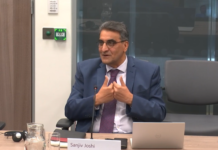Almost ONE THIRD of LGBTQIA+ Brits feel isolated due to not hearing stories about anyone like them
New research from StoryTerrace, the nation’s leading biographer, highlights the mental health benefits of learning about LGBTQIA+ experiences through the powerful tool of storytelling
Research from LGBTQ charity, Stonewall, reveals that half (50%) of those who identify as LGBTQIA+ has preciously experiences depression. This comes as new research from the nations’s leading biography-writing service, StoryTerrace, unveils that over a third (31%) of Brits from LGBTQIA+ communities have often felt lonely because they don’t hear enough about others who are going through similar experiences. In light of this, Rutger Bruining, CEO of StoryTerrace, discusses the benefits of sharing real stories from within the LGBTQIA+ community for future generations to gain a better understanding of their experiences and in turn generate greater acceptance.
StoryTerrace’s study highlights the importance of documenting and sharing people’s lived experiences to foster greater inclusivity amongst different communities. The nationally representative survey found that 33% of Brits who identify as queer admit that sharing their experiences with other people makes them feel more accepted and understood.
Representation within the LGBTQIA+ community has seen a notable shift in the past few years, with a report from GLAAD finding that across broadcast, cable, and streaming TV networks, the number of regular LGBTQIA+ characters rose from 6.4% in 2018 to 11.9% in 2022 indicating clear progress in this area. Despite this, StoryTerrace’s research reveals that greater strides must be taken to accept and understand the experiences of those in the LGBTQIA+ community.
In light of this, StoryTerrace is proud to highlight the stories from icons in the LGBTQIA+ community that have come through the service:
Chris Bock wrote a moving account about his great-great uncle, Paul Patek. The memoir, adventure story and novel: ‘An Ordinary Man’ recounts the moving journey of how one man risked everything to save his family from Nazi terror in WWII. Touching on issues pertaining to LGBTQ rights, anti-semitism and racism, this moving memoir is a story like no other.
The extraordinary narrative follows the life of an Austrian man, named Paul Patek, from his birth in 1893 to his death in 1978. From fighting in WWII on the Italian front to fleeing the Nazis in 1938 after they annexed Austria. Paul’s life was full of many twists and turns—good and bad. With luck and chutzpah, he saves five members of his family when he lands a job in Japan and wins the national lottery.
Paul’s boyfriend Carl (an Aryan) cashed the ticket for Paul which funded the passage of his nephews, sister, and parents to Japan, saving them from the Holocaust. After the war, Paul returned to Vienna and rebuilt a life that he was forced to flee with his partner.
StoryTerrace author, Roger Moreau, shares his heartfelt story of dealing with divorced parents, standing up for himself, and opening up about being gay.
Roger explains how his journaling experience evolved into the formulation of his life memoir. He comments: “It means a lot to me to be able to share my story in this way. Having written a manuscript of my life growing up in such a personal way and not being able to find the words to put it together, to now having it written in a way that makes me feel understood is amazing. I was emotionally tied to it and wasn’t sure I could tell my story properly.”
When discussing the representation of non-heterosexual protagonists in the media, Moreau says: “I think we have come a long way. When I was a teenager, seeing a gay character on television was rare. If you did see a gay character, it was mostly portrayed as something negative. It was either the person who was sick and dying from an illness or was a victim of gay-bashing. Today, there is so much acceptance and support –I absolutely love reading LGBTQIA+ memoirs and stories of someone overcoming adversity. It shows that there is hope, and to keep on going, no matter what you are going through in life.”
Rutger Bruining, CEO of StoryTerrace, discusses the benefits of sharing real stories from within the LGBTQIA+ community for future generations:
“LGBTQIA+ representation has a long history of being completely erased from the history books. This erasure and underrepresentation can cause many to feel disconnected from their own history, and experience feelings of loneliness, isolation, and exclusion. Sadly, in most cases, it has been found that personal diaries are all we have in terms of proof that queer identities existed in history.”
“When more LGBTQIA+ accounts are documented and shared, this renders visibility that contributes to society’s acceptance of people from all sexual orientations and identities. Therefore, it’s crucial to document these stories now, to show people in the future that there are people like them and that their stories matter.”
“One of the key benefits of writing a biography is how it brings people closer to their family, their history, and a better understanding of who they really are. If future generations can see similarities to themselves in past generations, it can encourage a greater sense of belonging, self-worth, and pride. For us, it is not just about documenting one’s story, it is about cementing your identity by connecting you with your past.”
Help keep news FREE for our readers
Supporting your local community newspaper/online news outlet is crucial now more than ever. If you believe in independent journalism, then consider making a valuable contribution by making a one-time or monthly donation. We operate in rural areas where providing unbiased news can be challenging. Read More About Supporting The West Wales Chronicle


























This is great
Not more homosexual flags –enough already,stop whining all the time.
Bob Hinton Why not keep you’re racist homophobic views to yourself,if you don’t like something scroll by. Nobody is whining but you.
Nick Venables wish I could but like a disease it’s everywhere. After the passing of the SOF 67,Lord Arran said:Lord Arran,in an attempt to minimise criticisms that the legislation would lead to further public debate and visibility of issues relating to homosexual civil rights made the following qualification to this “historic”milestone:“I ask those [homosexuals] to show their thanks by comporting themselves quietly and with dignity… any form of ostentatious behaviour now or in the future or any form of public flaunting would be utterly distasteful… [And] make the sponsors of this bill regret that they had done what they had done”Wish that had happened.